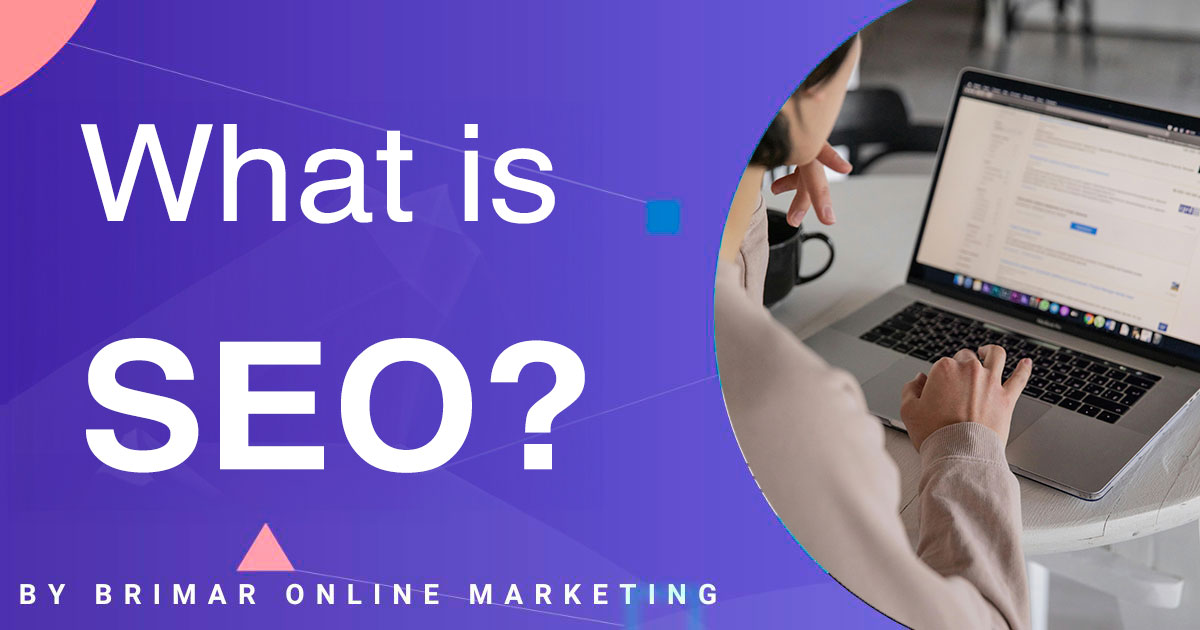
Have you ever wondered how some websites manage to pop up right at the top of your search results whenever you look for something online?
That’s the magic of SEO!
But hold on. What exactly is SEO, and why should you care about it?
Don’t worry; we’ve got you covered.
A brief explanation of SEO
SEO stands for Search Engine Optimization.
It’s basically the art and science of making your website more visible and appealing to search engines like Google, Bing, and Yahoo.
Think of it as giving your website a little boost so that it shows up higher in search results when someone types in a relevant keyword or phrase.
Importance of SEO for businesses in the digital age
Nowadays, having a killer website isn’t enough.
With millions of websites out there, how do you make sure yours gets noticed?
That’s where SEO comes in.
Whether you’re a small local business or a big international corporation, optimizing your website for search engines is crucial for attracting more visitors, increasing brand visibility, and, ultimately, driving more sales.
Purpose of the blog post: to demystify SEO for beginners
If the term “SEO” sounds like a foreign language to you, don’t worry, you’re not alone!
Many beginners find SEO intimidating, but it doesn’t have to be.
The purpose of this article is to break down the basics of SEO in simple terms, so even if you’re a complete newbie, you’ll walk away with a better understanding of how it all works.
Ready to dive in? Let’s go!
What is SEO?
Start Attracting Customers Through SEO Today!
We can help you attract new customers through Tailored Search Engine Optimization Strategies for Your Business.
Definition of SEO
At its core, SEO is all about optimizing your website to rank higher in search engine results pages (SERPs).
But what does that mean exactly?
Well, imagine you’re searching for the best pizza joint in town.
You type “best pizza near me” into Google, and voila!
A list of pizza places appears, with the closest to you at the top.
How did they get there?
That’s SEO at work.
How search engines work
Search engines like Google use complex algorithms to scan and analyze billions of web pages, looking for the most relevant and trustworthy results for any given search query.
These algorithms consider hundreds of factors, from the words on your website to the number of other sites linking back to yours.
By optimizing your website according to these factors, you can increase your chances of ranking higher in search results.
Importance of ranking higher in SERPs for visibility and traffic
Here’s the thing: when was the last time you clicked on a website that wasn’t on the first page of Google?
Exactly!
Studies show that the majority of clicks go to the top few results, so if your website isn’t ranking well, you’re missing out on valuable traffic.
By climbing the ranks and snagging one of those coveted top spots, you’ll not only get more eyeballs on your site but also more potential customers knocking on your door.
And who doesn’t want that, right?
Why is SEO important?

Have you ever wondered why some websites seem to magically appear at the top of your search results while others are buried on page five?
It’s not magic; it’s SEO – Search Engine Optimization.
Let’s delve into why SEO is so crucial for any business venturing into the digital world.
The significance of organic traffic.
Think of organic traffic as the Holy Grail of online success.
Unlike paid advertising, which requires constant investment, organic traffic comes naturally when your website ranks higher in search engine results pages (SERPs).
Picture this: when someone searches for a product or service related to what you offer, and your website pops up as one of the top results, that’s organic traffic at work.
It’s like having a steady stream of potential customers knocking at your virtual door without having to spend a fortune on ads.
Comparison between paid advertising and organic search traffic.
Now, let’s talk about the elephant in the room: paid advertising versus organic search traffic.
Sure, paid ads can give you instant visibility, but they come with a hefty price tag and disappear the moment you stop paying.
On the other hand, organic search traffic is like a renewable resource – it keeps flowing even when you’re not actively promoting your website.
Plus, studies show that users are more likely to trust organic search results over paid ads.
It’s like earning credibility points without spending a dime.
The trust factor associated with organic search results.
Imagine you’re looking for a reliable plumber in your area.
You type “best plumbers near me” into Google, and a list of results pops up.
Chances are, you’ll trust the plumbers that appear at the top of the list more than those buried on page three.
Why?
Because Google’s algorithm has deemed them trustworthy based on various factors like relevance, authority, and user experience.
That’s the power of organic search results – they’re like a virtual seal of approval from the internet gods, assuring users that you’re the real deal.
How does SEO work?
Alright, now that we’ve established why SEO is crucial, let’s demystify how it actually works.
Spoiler alert: it’s not as complicated as it sounds.
Search engine algorithms
Think of search engine algorithms as the secret sauce behind Google’s magic.
These complex formulas determine which websites appear at the top of SERPs based on various factors like relevance, authority, and user experience.
In simpler terms, they’re like the gatekeepers of the internet, deciding who gets to sit at the VIP table and who gets stuck in the nosebleed section.
Ranking factors: relevance, authority, and user experience.
Now, let’s break down the three musketeers of SEO: relevance, authority, and user experience.
Relevance is all about how well your content matches what users are searching for.
Authority refers to how trustworthy and reputable your website is in the eyes of search engines.
And user experience?
Well, that’s all about ensuring your website is user-friendly and easy to navigate.
Nail these three factors, and you’re well on your way to SEO success.
Importance of keywords and their relevance to content.
Last but not least, let’s talk about keywords – the bread and butter of SEO.
Keywords are the words and phrases that users type into search engines when looking for information.
By strategically incorporating relevant keywords into your content, you’re telling search engines, “Hey, my website is exactly what this user is looking for!”
It’s like speaking the same language as your audience and showing up at the top of their search results.
So, choose your keywords wisely and watch your website climb the ranks in no time.
Types of SEO

Regarding SEO, there’s more than one way to climb the search engine ranks.
Let’s break it down into three main types: On-page SEO, Off-page SEO, and Technical SEO.
On-page SEO
This is all about what you do within your website to boost your search engine visibility.
Think of it as giving your website a makeover to make it more appealing to search engines like Google.
You tweak things like meta tags, headings, and the content itself to make sure they align with what people are searching for.
It’s like putting up a sign that says, “Hey Google, check out this awesome content!”
Off-page SEO
Now, this is where things get a bit more social.
Off-page SEO involves strategies outside of your website that can still influence your search engine ranking.
It’s like spreading the word about your website across the internet.
You might do this by getting other websites to link back to yours (hello, backlinks!), or by engaging with your audience on social media platforms.
It’s all about building your website’s reputation and authority in the online world.
Technical SEO
Ever heard the phrase, “It’s what’s on the inside that counts”?
Well, that’s Technical SEO in a nutshell.
This type of SEO focuses on optimizing the nuts and bolts of your website’s infrastructure to make it easier for search engines to crawl and index your site.
We’re talking about things like site speed, mobile-friendliness, and fixing any technical issues that might be holding your website back from reaching its full potential.
Key SEO Practices for Beginners
Now that you know the different types of SEO, let’s dive into some key practices that every beginner should know about:
Keyword research
Imagine you’re throwing a party, but you have no idea what kind of music your guests like.
Keyword research is like asking your guests what songs they want to hear before they arrive.
It’s all about understanding what your audience is searching for so you can tailor your content to meet their needs.
On-page optimization
This is where you roll up your sleeves and start sprucing up your website.
Optimizing meta tags, headings, and content might sound technical, but it’s really just about making sure your website speaks the same language as search engines.
Think of it as giving your website a makeover to make it more attractive to Google’s algorithms.
Quality content creation
Content is king, they say, and for good reason.
It’s what keeps people coming back to your website and telling their friends about it.
When creating content, focus on providing value to your audience.
Whether it’s helpful how-to guides, entertaining stories, or insightful analyses, make sure your content is engaging, relevant, and, above all, valuable to your readers.
Link building
Backlinks are like upvotes from other websites, telling search engines that your website is worth checking out.
However, not all backlinks are created equal.
Focus on building quality backlinks from reputable websites in your industry.
It’s like getting a recommendation from a trusted friend – it carries more weight than a random endorsement from a stranger.
Mobile Optimization
These days, more and more people are browsing the web on their smartphones and tablets.
If your website isn’t optimized for mobile devices, you could be missing out on a huge chunk of potential visitors.
Make sure your website is responsive and easy to navigate on all screen sizes.
It’s like rolling out the red carpet for your mobile guests – you want to make sure they have a VIP experience from start to finish.
By mastering these key SEO practices, you’ll be well on your way to climbing the search engine ranks and driving more traffic to your website.
So roll up your sleeves, put on your SEO hat, and let’s get optimizing!
4 Common SEO Mistakes to Avoid

Alright, let’s dive into some common slip-ups that can trip up your SEO game.
These are the potholes you want to steer clear of:
1. Keyword Stuffing: Overloading on Keywords
You know those websites where every other word seems to be a keyword?
Yeah, that’s a big no-no.
Stuffing your content with keywords might seem like a shortcut to ranking higher, but search engines are smarter than that.
They can sniff out keyword stuffing from a mile away, and it won’t do your rankings any favors.
Instead, focus on natural, relevant keyword placement that flows with your content.
2. Ignoring Technical SEO: Don’t Sweep Website Infrastructure Under the Rug
Sure, optimizing your content is important, but don’t forget about the nuts and bolts of your website.
Technical SEO is like the engine under the hood—it powers everything else.
Neglecting things like site speed, mobile-friendliness, and crawlability can seriously hinder your SEO efforts.
So, roll up your sleeves and give your website’s infrastructure some love.
3. Neglecting Local SEO: Thinking Globally, Forgetting Locally
If your business relies on local customers (and let’s face it, most do), then local SEO is your best friend.
Ignoring it is like leaving money on the table.
Local SEO helps you show up in local search results, making it easier for nearby folks to find you.
So, don’t forget to sprinkle in some local keywords and claim your spot on Google My Business.
4. Neglecting User Experience: Slow and Steady Loses the Race
Picture this: You stumble upon a website that takes ages to load, has confusing navigation, and looks like it hasn’t been updated since the ’90s.
Frustrating, right?
Well, that’s what poor user experience feels like for your visitors.
Search engines want to deliver the best possible results to their users, so they take user experience into account when ranking websites.
Make sure your site loads quickly, is easy to navigate and looks good on all devices.
How to Boost Your SEO Strategy for Best Results
Now that you’ve got a solid grasp of what SEO is and why it’s important, let’s explore some actionable tips and best practices to take your SEO game to the next level.
Whether you’re a website owner, a business owner, or just diving into digital marketing, these strategies will help improve your search rankings and drive more traffic to your site.
Crafting the Perfect Title Tags and Meta Descriptions
Your title tags and meta descriptions are the first things users see on the search engine results page.
Think of them as your website’s handshake; it’s all about making a great first impression.
- Title tags must be brief, informative, and contain your target keyword.
- Meta descriptions should summarize your page’s content while enticing users to click. Use action-oriented language and address your target audience’s needs.
For example, instead of a generic title like “SEO Tips,” try something more engaging like “10 Proven SEO Strategies to Boost Your Website Rank.”
Internal and External Links: Your Website’s Roadmap
One of the most overlooked on-page optimizations is the use of internal links.
These links guide users (and search engine crawlers) to other relevant pages on your site.
They help distribute link equity and keep visitors engaged, improving the better user experience search engines love.
Don’t forget about external links, either.
Linking to reputable sources signals to search engines that you’ve done your homework and creates a more resourceful experience for your readers.
The Role of High-Quality Content in Search Engine Rankings
There’s no shortcut around it; high-quality content is the backbone of any effective SEO strategy.
Your content should:
- Address your audience’s questions.
- Be well-researched and free of errors.
- Include your target keyword naturally and avoid overstuffing.
Search engines favor great content that offers value to users..
By focusing on organic results, you’ll build trust with your readers and the search engines.
Leveraging Artificial Intelligence in SEO Marketing
With artificial intelligence revolutionizing the SEO landscape, it’s easier than ever to analyze trends, identify search terms, and fine-tune your strategy.
Tools powered by AI can help:
- Suggest better keywords.
- Analyze competitor strategies.
- Predict search engine rankings trends.
AI is an invaluable ally for business owners who want to stay ahead in search engine marketing.
Why Page Speed and User Experience Matter
Page speed plays a crucial role in your website rank and user satisfaction.
Visitors will bounce if your website loads too long, and search engines will notice.
Improving page speed boosts rankings and ensures a better user experience.
Here’s the best way to get started:
- Optimize image sizes.
- Minimize JavaScript and CSS files.
- Use a reliable hosting provider.
Optimizing Your Google Business Profile
For local businesses, a well-maintained Google Business Profile is a must.
It enhances your visibility in local search results, helping you connect with nearby customers.
Keep your profile up-to-date with accurate contact information, photos, and reviews.
This is one of the best practices for improving your local SEO efforts.
The Power of Keywords in SEO Marketing
Choosing the right target keyword for each page is essential.
Use tools to research search terms that your target audience is searching for, and create content that matches their intent.
Remember, aligning your keywords with your content ensures relevance, which search engines reward with higher search rankings.
Don’t Forget the Little Things
Sometimes, it’s the minor tweaks that make the most significant difference in how your SEO works:
- Add alt text to your images for accessibility and SEO.
- Make your site mobile-friendly to capture traffic from all devices.
- Implement schema markup to enhance search engines’ understanding of your content.
By following these best practices, you’ll be well on climbing the search engine results page and attracting more visitors to your site.
Whether you’re a seasoned pro or just starting, these tips will help you achieve sustainable search engine rankings.
Conclusion
Phew!
That was a whirlwind tour of the SEO landscape, but don’t worry if your head’s spinning a bit.
Let’s recap the key takeaways:
- SEO is about optimizing your website to rank higher in search engine results pages (SERPs).
- It’s crucial for driving organic traffic to your site and getting your business in front of the right audience.
- Remember to focus on natural keyword usage, pay attention to technical SEO, don’t forget about local SEO if it applies to you, and always prioritize a great user experience.
So, if you’re just starting out with SEO, take it one step at a time.
Start implementing some basic practices, like keyword research and on-page optimization, and watch your rankings climb.
And hey, if you ever want to dive deeper into the world of SEO, keep an eye out for more advanced tips and tricks in future posts.
Ready to take your SEO efforts to the next level?
Don’t hesitate to contact Brimar Online Marketing for expert assistance tailored to your specific needs.
Whether you’re just starting out or looking to optimize your existing strategy, our team is here to help you navigate the complex world of search engine optimization with ease.
Thank you for joining us on this journey to unravel the mysteries of SEO.
We hope this guide has equipped you with the foundational knowledge needed to kickstart your optimization efforts and achieve your online goals.
Remember, the world of SEO is constantly evolving, and we’re here to support you every step of the way.
Remember to follow us on social media to stay updated on the latest industry trends, updates, and insights.
Let’s continue this conversation and work together to maximize your online visibility and success.
Take Your SEO to the Next Level with Brimar Online Marketing
Feeling overwhelmed with all the steps involved in optimizing your website?
Don’t worry; SEO doesn’t have to be a solo journey.
At Brimar Online Marketing, we specialize in helping business owners and website owners create tailored SEO strategies that deliver real, measurable results.
Whether you’re looking to improve your search rankings, enhance on-page optimizations, or master local SEO with your Google Business Profile, our team is here to help.
With a focus on high-quality content, search engine marketing, and a better user experience, we’ll ensure your website gets the visibility it deserves.
Let’s work together to boost your search engine rankings, drive organic traffic, and grow your business.
Our SEO Services Have Helped Our Clients Increase Their Revenue!
“I highly recommend Brimar if your looking to grow your online business. You will be satisfied with the high level of expertise and high quality of services. It has helped my business grow by leaps and bounds.”
CEO

